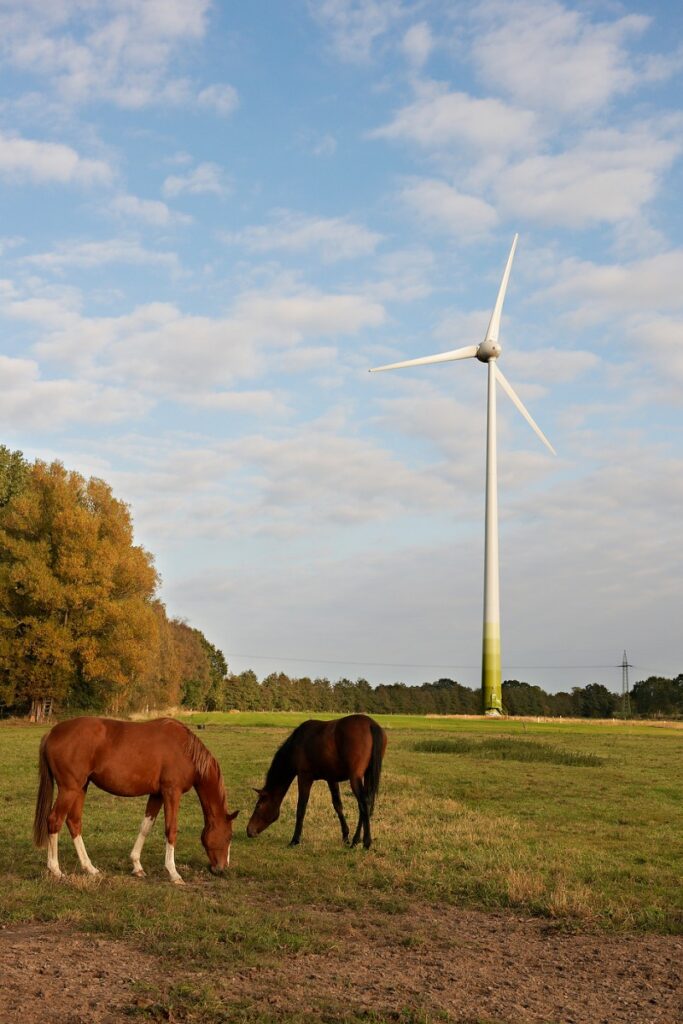In 2013 the global representative body for the global cooperative sector, the International Co-operative Alliance (ICA), decided it was time to take action on sustainability.
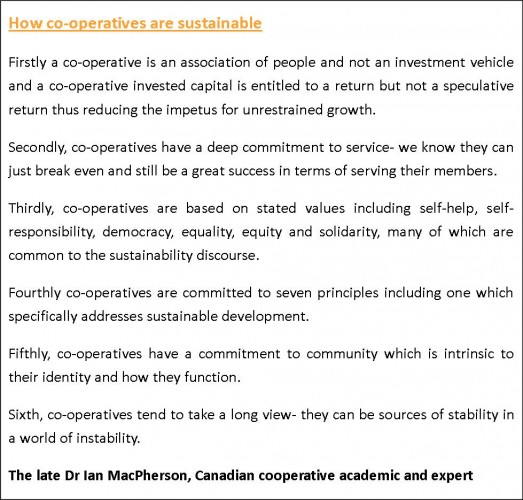
Oft used as a term to describe cooperatives, the ICA wanted to understand in great detail in fact how appropriate and accurate the term “sustainable” was to describe the cooperative movement and its members’ activities around the world.
It was at the World Economic Forum in a speech on sustainable development that the United Nations secretary-general Ban Ki-moon had sounded a clarion call to the globe: “We have mined our way to growth. We burned our prosperity. We believed in consumption without consequences. Those days are gone… Climate change is showing us that the old model is more than obsolete. It has rendered it extremely dangerous”.
It was in the same year that environmentalist Philippe Cousteau drilled deeper into these sentiments. “Investing in communities, investing in people, there is nothing more sustainable than that,” Philippe Cousteau, environmentalist, told co-operators at the International Co-operative Alliance’s General Assembly in Cancun, Mexico in 2011. “We cannot have environmental sustainability without social sustainability.”
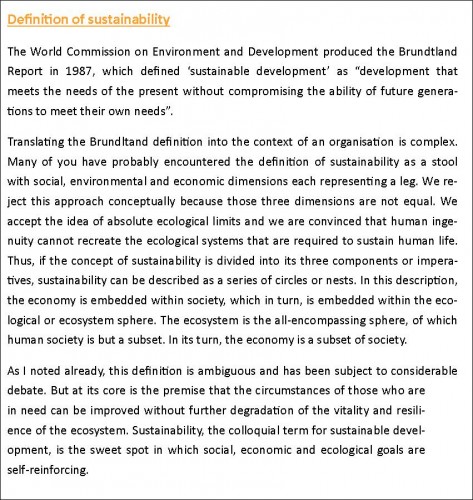
Fast forward to the close of 2013 when Yuill Herbert took the stage at the ICA’s Cape Town General Assembly and global conference. The ICA had hired Herbert and the Canadian cooperative consultancy Sustainable Solutions Group to conduct a detailed audit of the sector and its sustainability credentials.
“The Blueprint for a Co-operative Decade positions co-operatives as builders of sustainability, naming sustainability as one of five priorities for the coming decade,” said Herbert. Further, he continued, “a key part of this effort is to demonstrate convincingly that sustainability is inherent in the nature of co-operatives, and that co-operative enterprises make a positive contribution to sustainability.”
“There is a clear and direct relationship between sustainability and how cooperatives describe themselves,” said Herbert of the findings. “The linkages to social dimensions of sustainability are stronger than the linkages to environmental and economic dimensions, but all three are present. The analysis of the annual reports indicates these concepts are not merely a PR exercise but are also discussed in the context of the operations of cooperatives, albeit to a lesser degree.”
What global institutions say and do about coops as sustainable businesses
On the International Day of Co-operatives in 2013, Guy Ryder, the Director General of the International Labour Organisation made it clear that the UN views the cooperative model as a key to creating sustainability in global business. He said: “as global attention focuses on the challenge of sustainable development, cooperatives can and must play a role as creative enterprises expanding into new and innovative areas”.
But it’s not just the UN that has latched onto the concept of cooperatives as sustainable business models helping achieve sustainable outcomes for communities. In the final communiqué agreed to by the G8’s Development Financial Institutions (DFIs) in Paris April 23, 2012 co-operatives were highlighted.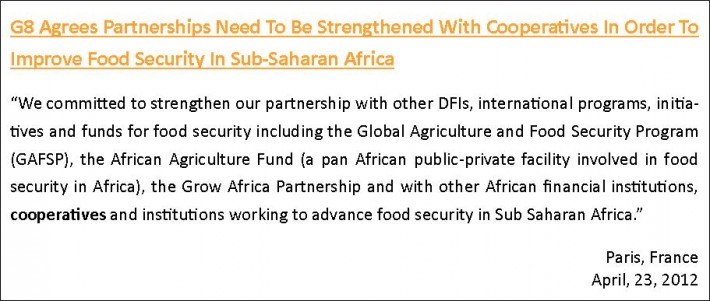
On June 22, 2012, 190 countries approved the Rio Plus 20 Declaration which included strong support for cooperatives.
United Nations sustainability meeting in Rio de Janeiro, Rio +20 said:
“We acknowledge the role of cooperatives and microenterprises in contributing to social inclusion and poverty reduction in particular in developing countries.”
“We resolve by [2020 / 2030] to sustainably increase agricultural production and productivity, including through improving the function of markets and international support mechanisms, particularly for the developing countries, with a view to increasing public and private investment in agriculture and rural development. Key areas for investment and support include: sustainable agricultural practices; rural infrastructure, storage capacities and related technologies to significantly reduce post-harvest and other food losses and waste throughout the food cycle; research and development on sustainable agricultural technologies; developing strong agricultural cooperatives and value chains; and strengthening urban-rural linkages.”
“We are encouraged by government initiatives to create jobs, for poor people in restoring and managing natural resources and ecosystems, and we encourage the private sector to contribute to decent work and green job creation for both women and men, and particularly for the youth, including through partnerships with small and medium enterprises as well as cooperatives.”
Rio De Janeiro, June 22, 2012
Then, in late 2012, at an FAO meeting, the Committee on Food Security agreed on the following:
The committee “called upon Member States, international organizations and other stakeholders to ensure that social protection systems embrace a “twin-track” strategy to maximize impact on resilience and food security and nutrition, through:
provision of essential assistance in the short-term while simultaneously protecting o rebuilding productive assets and infrastructure that support livelihoods and human development in the long-term; fostering integrated programs which directly support agricultural livelihoods and productivity for the poor, particularly smallholder farmers and small-scale food producers, including through production input support, weather, crop and livestock insurance, farmer organizations and co-operatives for market access, decent jobs and public works that create agricultural assets, home-grown school feeding that purchases food from local smallholder farmers, in-kind transfers (food, seeds), vouchers and cash transfers, agricultural livelihood packages and extension services”.
What the International Co-operative Alliance says on Sustainability
 The Blueprint for a Co-operative Decade is the ICA’s strategy for the global cooperative sector to take it through until the end of this decade. At its core is the belief that, as people-centred businesses, cooperatives can be the preferred model of business by 2020.
The Blueprint for a Co-operative Decade is the ICA’s strategy for the global cooperative sector to take it through until the end of this decade. At its core is the belief that, as people-centred businesses, cooperatives can be the preferred model of business by 2020.
The ICA highlights three co-operatives as having financial health, environmental concern and social purpose at their core.
- SEWA(India) – The “Shri Gitanjali Mahila SEWA Industrial Stationary Producers Cooperatives Ltd” is an Indian cooperative established in 1995 and involved in the manufacturing of various paper products made from recycled waste paper. The objectives of the cooperative are to reduce and recycle waste, to provide an alternate livelihood and to teach new skills to waste pickers who are members. The waste pickers are mostly women, who pick out recyclable materials from mixed waste to create hand crafted products. Among the products of the cooperative there is a wide range of paper products made from the waste materials such as notebooks, diaries, pens, paper bags and innovative jewelry. Workers not only play a vital role in society by keeping the surroundings clean and tidy, but they also earn an income for their families. The cooperative is promoted by SEWA, Self-Employment Women’s Association, also a cooperative group, involved in the organization of waste-pickers work since its creation in 1972. Read more about SEWA on Stories.coop
- Ecopower (Belgium): As peak oil becomes a favourite topic and energy prices continue to rise, renewable energy is on the minds of governments, businesses and citizens. The Ecopower co-operative has brought back co-operative values into Belgium and is a blueprint for new co-operative development. Ecopower functions by collecting funds from members which are used to develop renewable energy sources. The key to this co-operative is giving members both a personal stake and a share in sustainable energy sources. Read more about Ecopower on Stories.coop
- Cooperativa Los Pinos – ACOPALP (El Salvador) ACOPALP began its existence as a cooperative dedicated to producing coffee. But with some innovative thinking amongst its members, it has become a true agent of local development. The co-operative is behind the building of houses, schools, health centers, water facilities and electricity and community facilities, as well as recreation facilities.
The ICA believes that cooperatives with their values which are very much centred around sustainability are a successful model for today’s world – a world which is looking for better alternatives amid youth disillusionment and a rising tide of environmental activism and community action. The ICA says
“Around one billion co-operative memberships exist across the world today, which is about three times the number of individual shareholders in share market-traded companies and from the 1.4 million co-operatives in operation across the world more than 3 billion jobs are created.”
It points to the UN’s Food and Agriculture Organisation documentation of the fact that smallholder farmers and other producers can negotiate better terms in contracts being members of a cooperative. Hence, they need to spend less on production inputs such as seeds and fertilizer. Members of cooperatives also have more marketing and risk reducing opportunities.The cooperatives the ICA highlights as representing this movement for the times are:
- Red Gráfica Cooperativa Ltda (Argentina): this co-operative group is made up of 18 cooperatives in the printing sector in Argentina which together cover all processes of the value chain of the industry, from design to binding, through prepress and offset printing system flat and rotary gravure and flexography
- CCU (Bulgaria): CCU is a consumer cooperative which has emerged from the turmoils of the collapse of communism, to reinvent itself as a cooperative and provides an example of emerging governance and true membership. Read more about CCU on Stories.coop.
- Indian Farm Forestry Development Co-operative (India): This umbrella co-operative is turning wasteland back into forest in three north-central states of India, Rajasthan, Uttar Pradesh and Madhya Pradesh. So far the 143 primary forestry societies which are its members have regenerated 27,000 hectares of wasteland. This regeneration allows subsistence farmers to become adept in forestry farming
- Eksteenskuil Farmers Association (South Africa) In 1994, raisin farmers in the Eskteenskuil community got together to form the Eksteenskuil Farmers Association (EFA) with the objective of helping small-scale farmers get access to training as well as encourage other farmers to start vineyards and support social development. Membership of the EAC stands at 89 and is open to all HDI small-scale raisin producers in the area. Most are individual farmers and some have joined forces to operate as small companies. The members farm a total area of around 367 hectares with raisin grape vines grown on about 240 hectares. Around 60% of members own less than 5 hectares of arable land each. Season workers are employed by 80% of farmers to help with pruning and harvesting. Combined, the members employ several hundred seasonal workers.
There are multitudes of other cooperatives around the world that are thriving in their sustainability efforts. Desjardins in Canada has been recognised as the world’s third most sustainable cooperative.
Corporate Knights looked at the five largest cooperatives in each of the G7 countries and applied 12 criteria to measure their performance. The magazine praised Desjardins for the growth of its socially responsible investment products, which totalled $831.2 million as at December 31, 2012.
According to Corporate Knights: “Many of its financial services are designed to ease the burden for lower-income households, including small 24-months interest-free loans for individuals in trouble. Home insurance packages are offered for any level of income.”
Amongst the representative organisations there are also moves to increase the focus on sustainability. The National Cooperative Grocers Association has appointed a Sustainability Specialist Sheila Samuelson. It has many members with a strong focus on sustainability, implementing sustainability programs.
The Durango Natural Foods Co-op in Colorado, United States, for example, lists its sustainability measures, both in terms of social and economic.
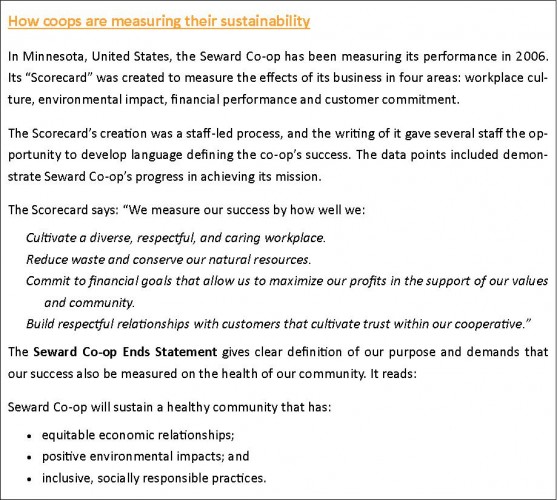
Best Practice: Teachers Mutual Bank Acknowledged Globally in FT Index
Steve James, CEO of Teachers Mutual Bank, says: “As a small Australian financial institution competitively benchmarked against large global companies, we’re punching well above our weight, not only in the finance sector but against all sectors. Achievement of Gold status shows that we are a responsible business and that, for us, CSR is built-in, not bolted on.” Teachers Mutual Bank was awarded gold status in the latest Corporate Responsibility (CR) Index published by the Financial Times newspaper.
“As a mutual bank, we believe that profit has a purpose. In the past 12 months, we’ve continued to improve our organisational performance to become a national and international leader in sustainability. We are honoured to receive such a high accolade for our effort.”
Measures that contributed to the bank’s performance and score included:
- Total community investment of 4.18% of pre-tax profits, 10 times the finance sector average
- Platinum Sponsorship of CUFA, the development agency for the Australian mutual banking sector
- Awarded the Equal Opportunity for Women in the Workplace Agency (EOWA) Employer of Choice for Women citation
- A 17% reduction in greenhouse gas emissions, a 25% reduction in paper usage, and an increase in paper recycling of 63%.
“Sustainability is a core business value at Teachers Mutual Bank. We believe success is not only measured in terms of profit and growth, but also by how we engage with and support our members, our communities, our employees, and how we minimise our impact on the environment,” he said.
Related links:
- Watch Philippe Cousteau discuss Socially Responsible Investing and Sustainability
- Read stories about Desjardins Groups’s activities around the world on Stories.coop
- SAGUAPAC, Bolivia story Stories.coop “Clean Water – Cooperative Principles”
- Watch Alaska Seafood Cooperative Sustainable Fisheries video

